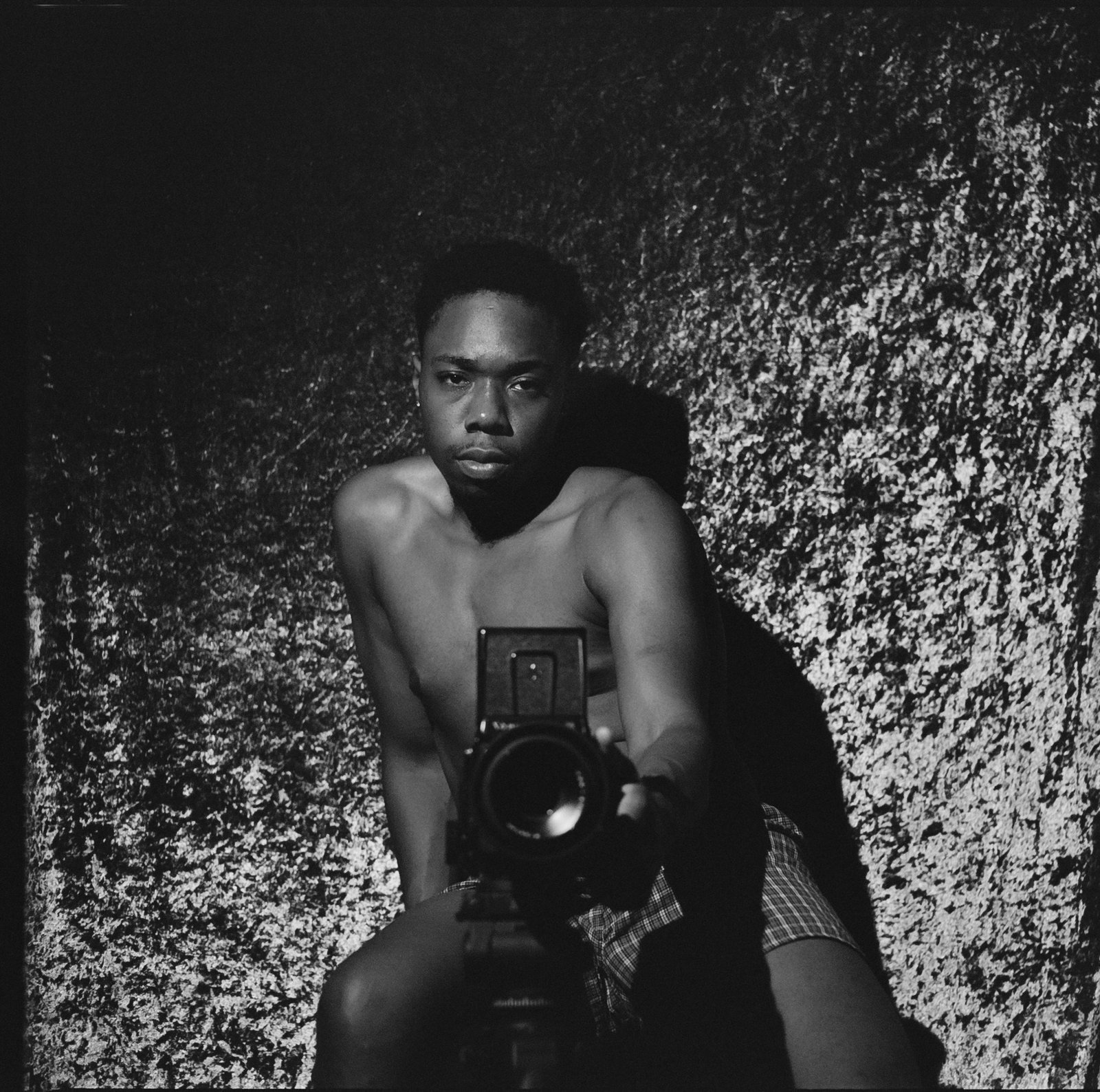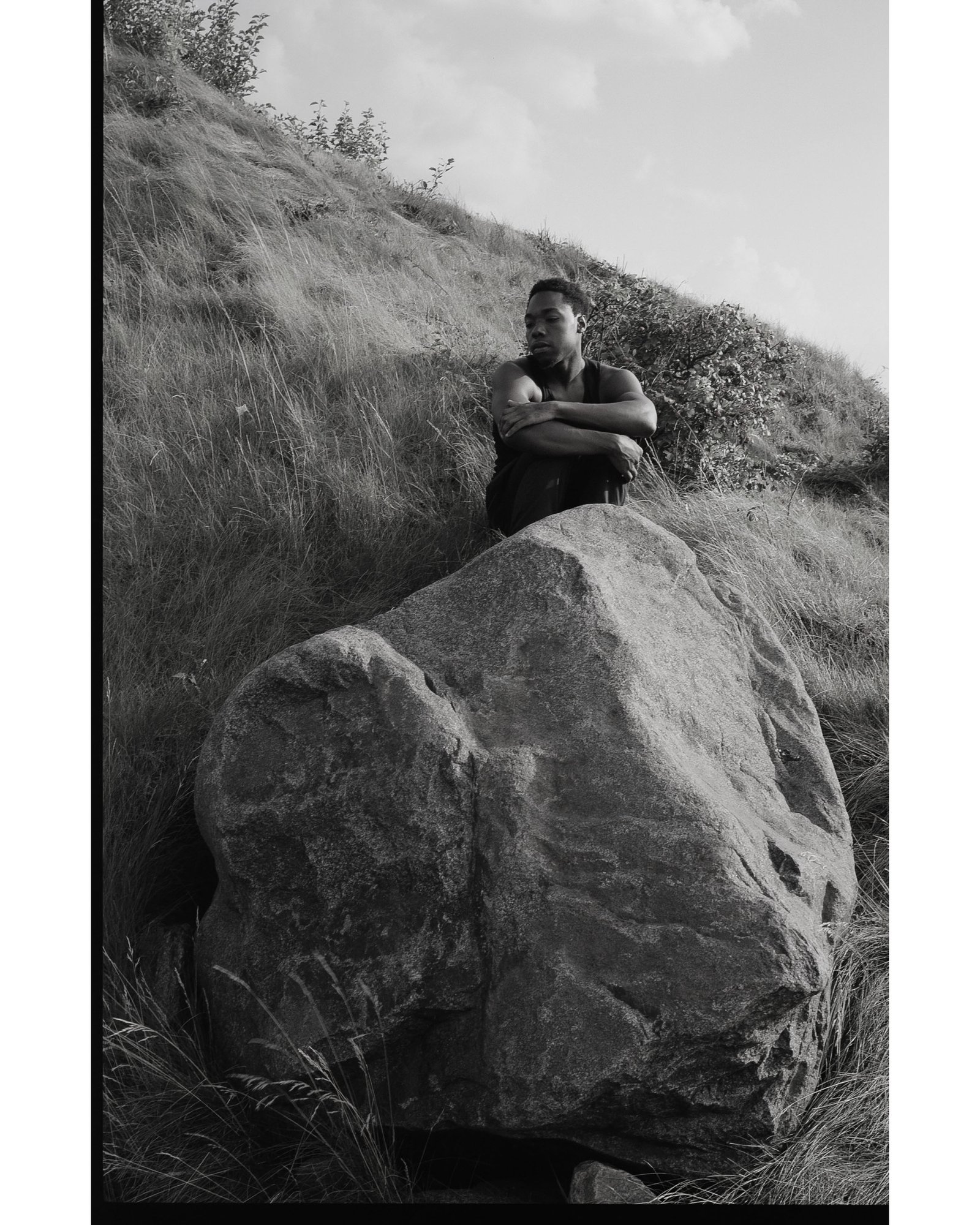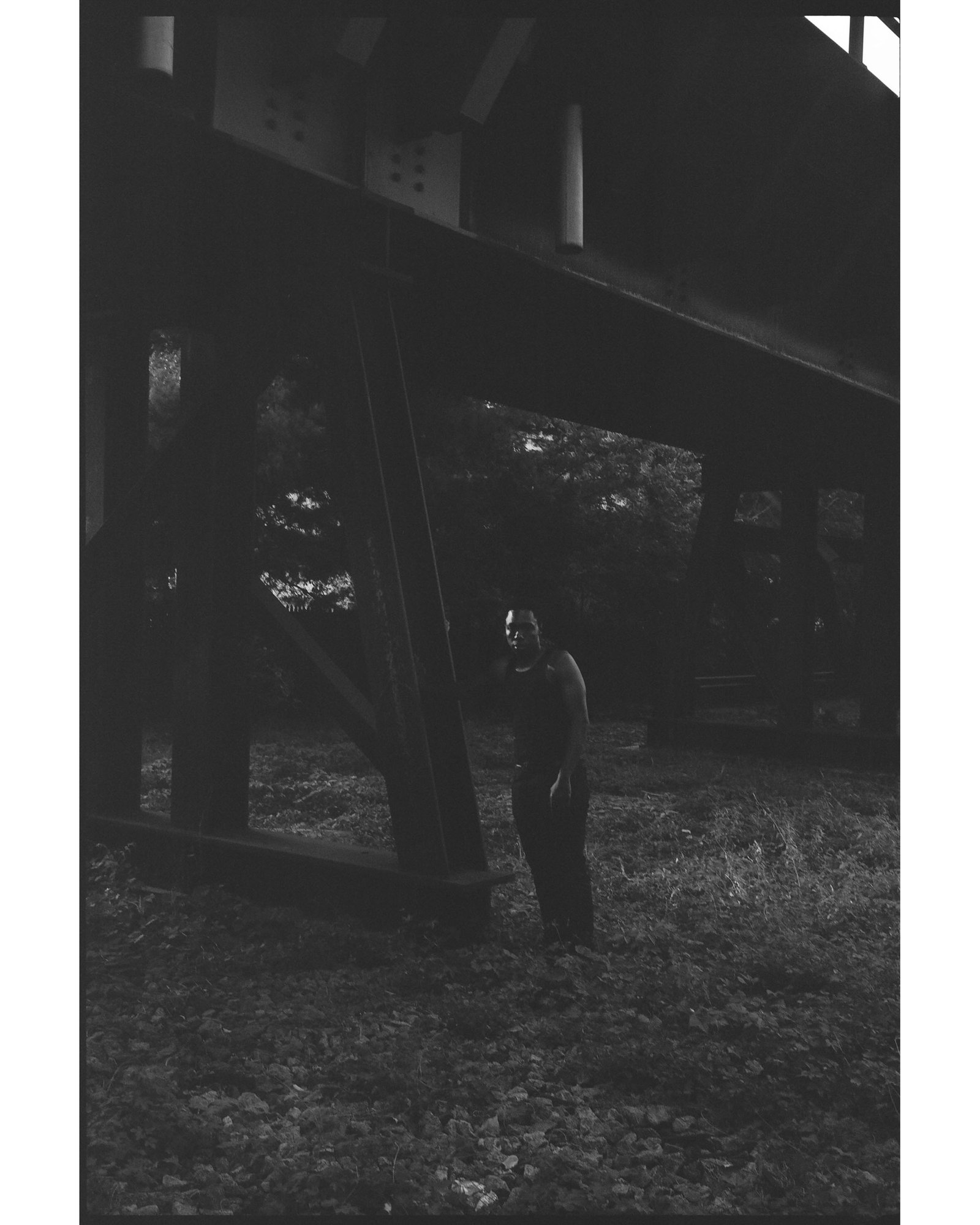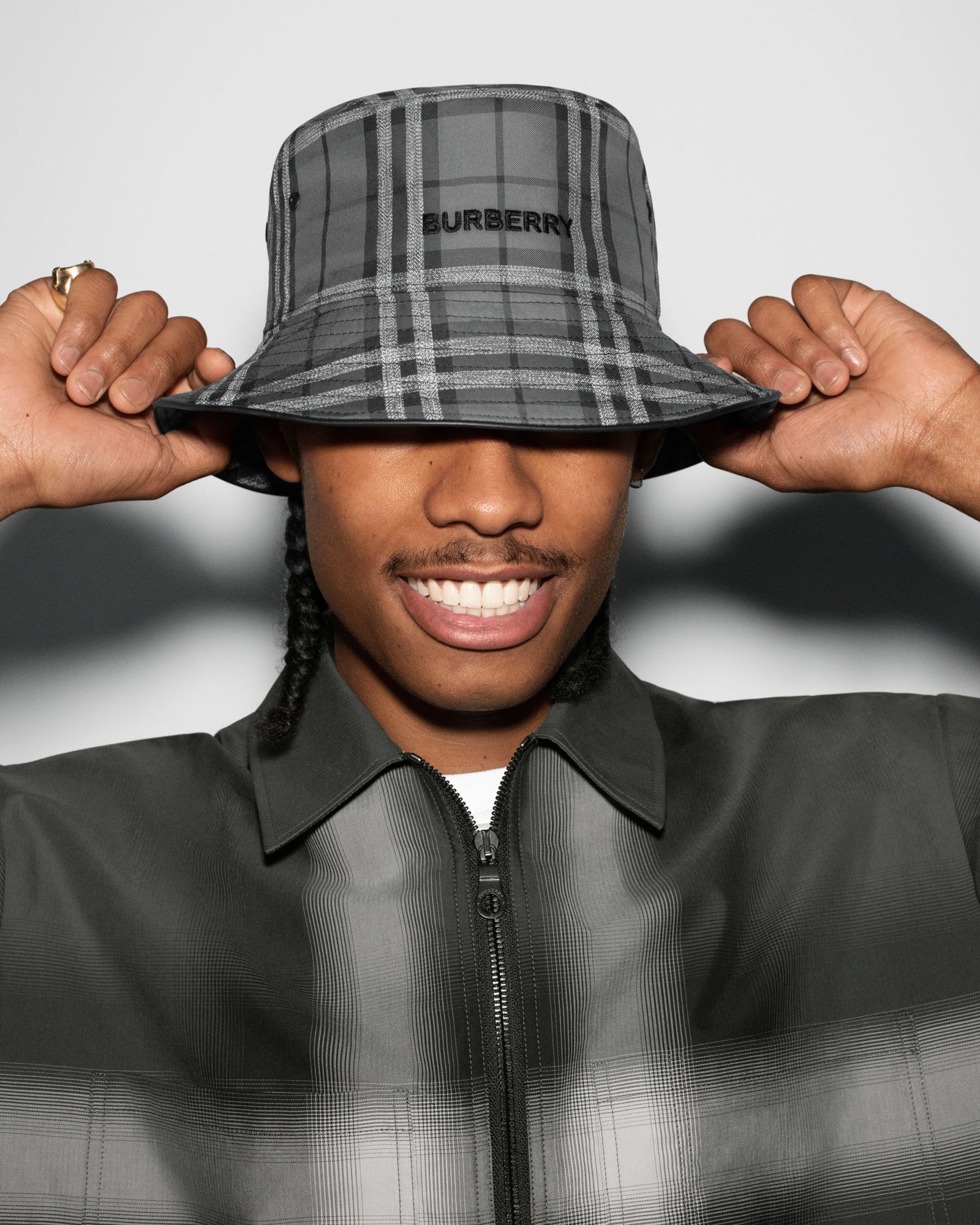From emerging to established, Bruce Bennett, speaks with Hank Willis Thomas
This conversation originally appears in Justsmile Issue 2, Together in the Fold, accompanied by Bruce Bennett's photographic series 'Love II.'
Photography Bruce Bennett

Self-portrait by Bruce Bennett, 2021.
Chicago-born, now New York City-based photographic artist Bruce Bennett, who explores Black love and faith, speaks with Hank Willis Thomas, a prolific multi-disciplinary artist. Willis' work often reflects on the commodification of the Black male identity in America through media representations and social justice. The two artists converse about searching for freedom, being conscious of struggle, and learning to foster a community of openness and love.
Bruce Bennett: I have some questions that I wrote down for you. One simple question is: what inspires you today?
Hank Willis Thomas: I think I’m inspired by the opportunity to overcome obstacles, that are within me to get to a greater place of liberation. I feel like I’m not the only person [who’s like this] – we often confine ourselves and put ourselves in boxes, or let society put us in boxes, and we have to navigate through those boxes to find the freedom.
BB: One of the main questions I wanted to ask you –I actually put a star next to it –is, what is your definition of freedom?
HWT: I think freedom is an awareness of the way, in which your choices –regardless of your circumstances – impact your notion of who you are and what you are capable of. So, I mean to say, I’m not sure if we’re ever [or] always free. But in the moments or glimpses of freedom, that I’ve had, I felt relieved and I felt acceptance of my life, and appreciation and gratitude for what I saw in front of me. That didn’t mean that I could go and do whatever I wanted, but I knew that what I wanted was whatever I could have.
BB: Exactly! Internally, yeah. Living in this country, you know we are never going to have freedom, but I look at art today and I feel like as African-Americans we don’t look for freedom, it finds us because we go through these horrific moments, these historic events that have been going on for the past year or two. I see it that overcoming these obstacles makes us more free; striving for our pride and greatness. I see a lot of that in your work. It becomes a passage for younger artists, to see how freedom works for you, and in many artists’ work.

From 'Love II' by Bruce Bennett 2021.
BB: Now, another question that I had in mind is, what is one piece you created that is timeless in your eyes? Or one you see as being made today, and being needed today?
HWT: That’s a tough question, but the first piece that comes to mind was actually inspired by words of my cousin, who said, ‘Love overrules.’ And it's a neon work; there’s one out in Portland, there's one in San Francisco, there's one in North Carolina, Charlotte. They go from saying ‘LOVE OVERRULES,’ to ‘LOVE RULES,’ to ‘LOVE OVER RULES.’ I think that is forever relevant.
BB: In my art, I primarily look at or focus on Black love. My inspiration for my work for the past five or ten years was my relationship, kids, movements; I look at love to be the template of art. Love travels through every stage.
I’ve also been thinking about how struggle has been a main part of many artists’ creative process; I’ve been having that conversation with others, and I often ask why struggle is such a source of inspiration. I even asked myself this. I hold back on trying to create things around struggle, but, you know, it comes to us in a way. So, for you, why is struggle such an important factor for today’s art?
HWT: You know, I’ve been looking at my work recently and just asking myself the same question, so I don’t know if I can answer it … Often, artists’ work is mirroring the society they live in, and we often work in the subconscious of our society. So, I make art that is reflecting a moment now. This is [also] why I was asking the question for myself: ‘what if I was not to be so caught up in the struggle?’ Because so much of life is also joy. And exhilaration. We don’t often know how to often really embrace that story in art.
BB: Absolutely. Being a Black man in America, we face the struggle so much. I feel like I don’t want it to be shown so much in my work. Because, you know, it feels personal; it feels like something that I’d want to capture, but there are moments that I tear up when I capture a person being harassed by the police – it can be pretty striking. It takes a big toll on me, from the heart.
Another question that I had was about family. How has your relationship with your family impacted your creative process throughout your career?
HWT: Well, that’s a great question. In some ways, my grandmother is my muse, because she is a ninety-nine-year-old Black woman from Philadelphia – lived there all her life. Regardless of her economic situation, or policies that were designed to confine her, she’s always been free. [She has] this liberated spirit, which for her is inspired by her faith in God –specifically through Christianity. It’s been something that I’ve always been in awe of, because I recognize how faith can be a superpower. It can be a guiding light. That is, in different ways, transformed and affected my life, the lives of both my parents, my mother, my father, but also aunts and uncles, to really follow their dreams and liberate themselves, taking the road less travelled through life. I think I’ve just been following off that road in their footsteps.
"I want to see more acknowledgement that everyone is in a process of growth, and less penalizing or marginalizing based off of what someone once did or once said." - Hank Willis Thomas
BB: I’m glad you brought up faith; I have ‘faith’ tattooed on my hand. I’m glad that’s a part of you, because it’s also a part of me, throughout my career.
I also want to know, what are some artists that you have seen or explored that have opened your eyes recently?
HWT: In a weird way, with a daughter, and focusing on family so much, I actually feel less up to speed about what’s going on in our world. But I can see, overall, that your generation is really going gangbusters. There are so many artists making statements and putting the work out there and having the work be seen, and celebrating and supporting one another, that it’s been really kind of overwhelming.
BB: Yes, I say the same thing. I see it every day, someone’s supporting another one. Strangers become a family.
What’s something you want to see more of today?
HWT: I want to see more acknowledgement that everyone is in a process of growth, and less penalizing or marginalizing based off of what someone once did or once said. I want to find ways for us to be in a community of openness and love, but also accountability that is connected to growth, rather than what seems like one-upmanship, or a ‘holier than thou’ attitude.
BB: That’s something I want to see more of too.
Do you have any questions for me?
HWT: Where do you go from here?
BB: That’s a good question. My goal is to be the best me; to look at my artwork, at what I produced today, and to be creating work based off of myself, my actions, and my thinking process. I just want to shine a light on anything that’s in my pathway, anything that I can be a part of in New York or New Jersey.
I would love to travel to cities that I can contribute to: go back to Chicago, see what I can do that will benefit others, maybe Detroit or Minnesota. I have families in these different cities and I want to create a moment.

From 'Love II' by Bruce Bennett 2021.
HWT: Have you thought about going to Nairobi or Kigali? Or Lima?
BB: You know, that’s been in my head. It’s about time and trying to find the best opportunity.
HWT: You know what they say?
BB: What do they say?
HWT: There’s no time like the present … When you’re ready, let me know. I can help you go.
BB: Well, I’m ready to see it. A different life, a different space, would be inspirational. What’s a place that’s done that for you?
HWT: I’ve been all over! The major takeaway for me is how we get so caught up in believing that our world is the world, in an American context, thinking what’s happening in the US is happening everywhere else in the world. Then you go someplace … I met one person who has never even heard of New York. That was really liberating, to realize that this world [the US] doesn’t exist in everybody’s mind.
BB: I have this book in my hand [All Power: Visual Legacies of the Black Panther Party, ed. by Michelle Dunn Marsh and Negarra A. Kudumu, Minor Matters, 2017], which was one of my first publications. I don’t know if you remember it.
HWT: Yeah, Michelle’s book.
BB: This happened years ago. So, coming around to actually speaking to you [Willis Thomas is also featured in the book], it shows how you just don’t see what’s going to happen for you.
HWT: It’s belief in yourself, and your vision.
BB: There’s a lot more to come.
